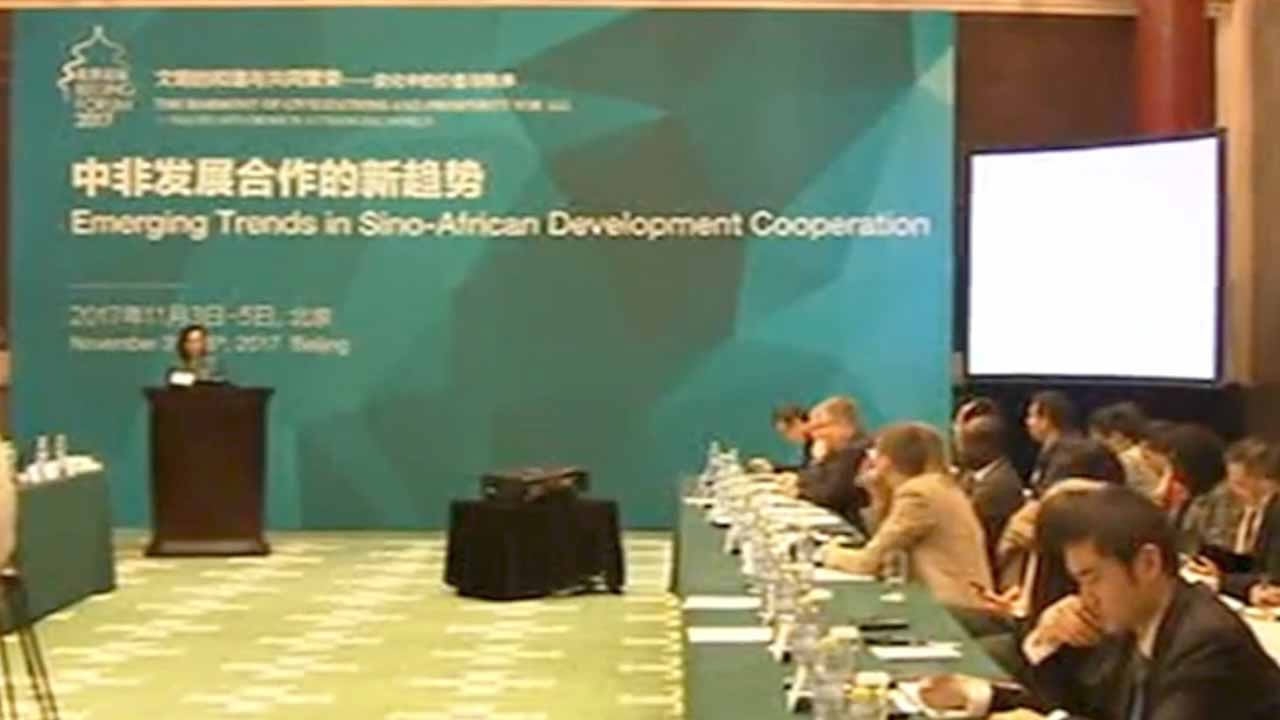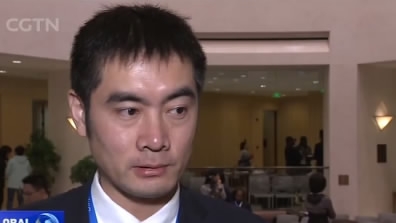
Business
15:52, 06-Nov-2017
Experts meet at China-Africa Cooperation Forum in Beijing
By CGTN's Ren Xueqian

World-renowned scholars and experts gathered in Beijing last weekend at the second China-Africa Conference, which looked at how joint initiatives between the two sides can be taken forward.
Co-hosted by Peking University and Yale University, the event themed “The Emerging Trends in Sino-Africa Development Cooperation” emphasized the need to build on promising relations in a new era. It took place in conjunction with the 14th annual academic Beijing Forum.
"China has strengthened its policy communication mechanisms and development strategies in Africa," said Guo Haiyan, a spokesperson of the Department of African Affairs of the Chinese Foreign Ministry. "We are willing to strengthen exchanges and share our developmental experiences with our African counterparts and vice versa.”

Guo Haiyan, a spokesperson for the Chinese Foreign Ministry's Department of African Affairs. /CGTN Photo
Guo Haiyan, a spokesperson for the Chinese Foreign Ministry's Department of African Affairs. /CGTN Photo
Guo added that in conjunction with supporting Africa in implementing African Union and United Nations agendas on country development, China will explore adequate methods of cooperation in its own Belt and Road Initiative that’s suitable for every African country.
In areas concerning project funding on the continent, Guo said China has delivered 60 percent of the 600 billion dollars announced during the sixth Forum on China-Africa Cooperation (FOCAC) in Johannesburg in 2015.
In addition, China estimates to have provided professional training and capacity building to approximately 100,000 African personnel, including 20,000 training opportunities in China and 10,000 government scholarships.
Over the past decade, China and Africa have established a new type of strategic partnership in areas including economic development, infrastructure, investments and agriculture. But, such rapid expansions have brought about some new challenges.
Dr. Geng Jianzhong of the Foreign Economic Cooperation Centre of the Ministry of Agriculture in China said in the process of modernization in Africa, the key problem is not only finding technological solutions that are applicable to the country’s unique environmental conditions, it’s more of finding solutions that can be accepted and absorbed by local African communities.

Dr. Geng Jianzhong from the Foreign Economic Cooperation Center of the Ministry of Agriculture /CGTN Photo
Dr. Geng Jianzhong from the Foreign Economic Cooperation Center of the Ministry of Agriculture /CGTN Photo
“Skillsets and technologies we have in China and might not be accepted in Africa,” Geng explained. “It’s a country with different ecological conditions and social norms. We’ve spent a large amount of time researching what will be workable in Africa, and this evaluation process takes time.”
While mitigating these socioeconomic concerns is seen as essential for progress, experts believe it can be achieved through better cooperation in education. In the case of Africa, this means proper knowledge and technology transfers from its Chinese partners.
“Perhaps the most significant contribution from China can be more comprehensive and strategic approach in terms of knowledge transfer from the best practices and lessons,” said Ana Alves, author and assistant professor at Singapore’s Nanyang Technological University.
With so much Chinese FDI now in Africa, China is expected to become increasingly influential both in areas of economic development and cultural exchanges.
Dr. Alex Vines head of Africa Program at Chatham House explained that as China’s Africa engagement continues to evolve, the focus now for Africa is learning how to navigate these opportunities. He added that financial and development support is available, if African countries are able to guaranteed their own political stability and economic openness.
“Discussions such as this one offer an important platform for collective dialogue for international journalists, professionals and NGOs,” Li Anshan, dean of Center for African Studies at Peking University, said, “It’s a great way for people from both sides to exchange cultural knowledge, and share insights on furthering China-African ties.”
1km

SITEMAP
Copyright © 2018 CGTN. Beijing ICP prepared NO.16065310-3
Copyright © 2018 CGTN. Beijing ICP prepared NO.16065310-3